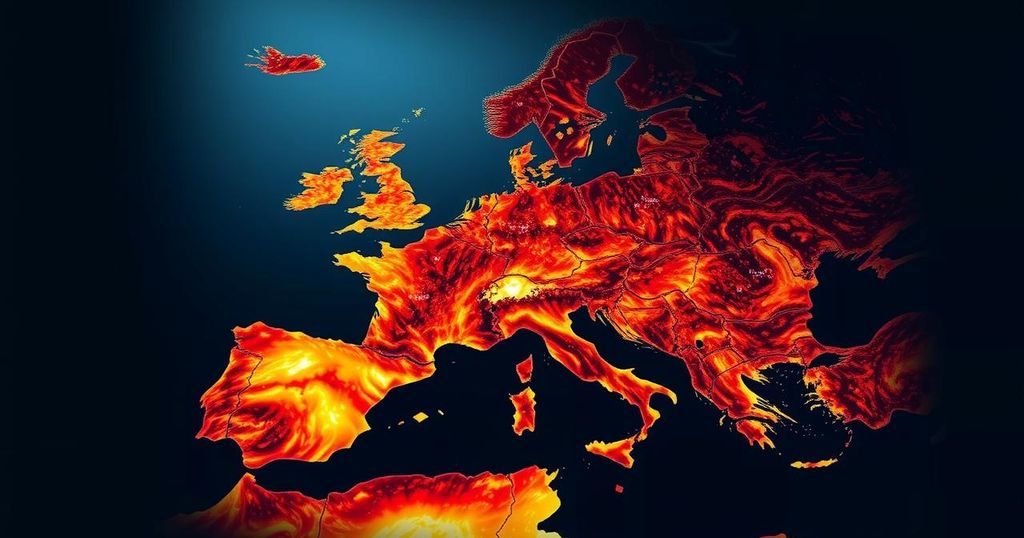Climate change
ASIA, AZERBAIJAN, BUONTEMPO, CARLO BUONTEMPO, CLIMATE, CLIMATE CHANGE, COP29, COPE, COPERNICUS, COPERNICUS AGENCY, ETH ZURICH, EUROPE, EUROPEAN CLIMATE AGENCY, EXTREME WEATHER, GLOBAL WARMING, GREENHOUSE GAS EMISSIONS, PARIS AGREEMENT, RESEARCH, REUTERS, SEN, SONIA SENEVIRATNE, SWITZERLAND, UNITED NATIONS
Marcus Li
0 Comments
Europe Scientists Forecast 2024 to Set New Global Heat Record
European scientists predict that 2024 will be the hottest year on record, breaking 2023’s record heat. The Copernicus Climate Agency states it will mark the first occurrence of global temperatures exceeding 1.5 degrees Celsius above pre-industrial levels. This projection is made in the context of the forthcoming COP29 climate conference, compelling discussions on financial investments to combat climate change.
Scientists from Europe have indicated that 2024 is projected to set new records for global temperatures, surpassing those established in 2023. According to the Copernicus Climate Change Service, it marks a significant milestone, being the first year to exceed an increase of 1.5 degrees Celsius compared to pre-industrial levels, defined as the period from 1850 to 1900, characterized by the commencement of extensive fossil fuel combustion. This alarming forecasting comes in advance of the United Nations COP29 climate conference in Azerbaijan, where global leaders are anticipated to advocate for enhanced financial commitments to combat climate change. From January to October, average global temperatures surged, positioning 2024 as almost certainly the hottest year on record, as acknowledged by Copernicus, which has maintained temperature records dating back to 1940 and compared them with historical data since 1850. The Director of Copernicus, Carlo Buontempo, attributed this year’s unprecedented heat levels primarily to climate change. “The climate is warming, generally. It’s warming in all continents, in all ocean basins. So we are bound to see those records being broken,” he noted. He also emphasized that this warming trend would not be occurring without the persistent influx of carbon emissions into the atmosphere, attributable to the combustion of coal, oil, and gas. Furthermore, Mr. Buontempo highlighted the critical nature of global monitoring and data collection for validating their predictions, drawing from an extensive array of measurements via satellites, vessels, aircraft, and meteorological stations worldwide. Sonia Seneviratne, a climate scientist at ETH Zurich, expressed that she was not taken aback by these new findings and stressed the urgency for COP29 delegates to pursue more vigorous measures to curb the reliance on carbon-emitting fossil fuels. “The limits that were set in the Paris agreement are starting to crumble given the too-slow pace of climate action across the world,” Seneviratne remarked. Since the 2015 Paris Agreement, various nations have pledged to cap the rise in average atmospheric temperatures to no more than 1.5 degrees Celsius over several years. Officials from Copernicus have cautioned that this threshold could be breached as early as 2030, with Mr. Buontempo stating, “It’s basically around the corner now.” Climate experts assert that even slight temperature increases can trigger severe weather phenomena, citing recent devastating events such as floods that claimed hundreds of lives in Spain and wildfires in Peru. In Bangladesh, substantial flooding resulted in the loss of over one million tons of rice, consequently driving up food prices.
The current data on global temperature rise is alarming, with 2024 set to exceed previous records and cross the critical 1.5-degree Celsius threshold that scientists have indicated is pivotal in mitigating climate change impacts. This measurement is based on extensive historical climate data collected since the mid-19th century and serves as a critical marker in international climate discussion, particularly leading up to major events such as COP29. The discussion is focused around actionable strategies to limit carbon emissions and, ultimately, the reliance on fossil fuels, which remain a major driving force behind the climate crisis.
In summary, Europe’s climate prediction underscores an urgent call to action as scientific data predicts 2024 to be the hottest year on record, likely surpassing 2023’s high temperatures. It underscores the necessity for global commitment to transition away from fossil fuels and mitigate the long-term impact of climate change, as highlighted during the upcoming COP29 climate summit. With alarming temperature increases already influencing extreme weather events worldwide, immediate and robust action is imperative to avert further catastrophic climate consequences.
Original Source: learningenglish.voanews.com




Post Comment